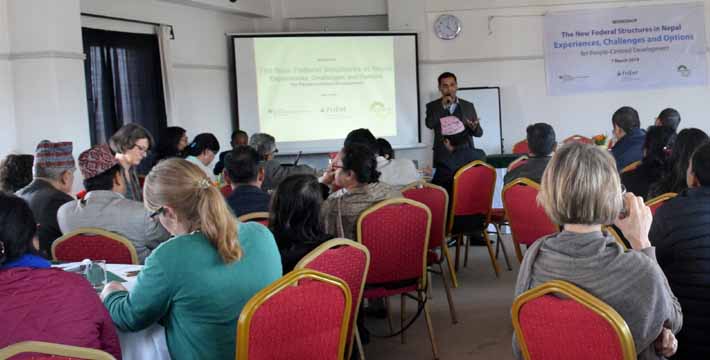
The Working Group on Peace and Development (FriEnt), an association of nine governmental organisations, church development agencies, civil society networks, and political foundations and the Nepal Dialogue Forum for Peace and Human Rights (NDF), Germany a network of German CSOs creating opportunities for dialogue and advocacy of human rights, the rule of law and peace building together with its CSO partners in Nepal organized workshops tilted “The new federal structures in Nepal: Experiences, challenges and options for people-centred development” on 7 and 8 March 2019 in Kathmandu which was hosted by FIAN Nepal and facilitated by Ms. Basudha Gurung, member and advisor of FIAN Nepal. Development practitioners working in from different sectors shared their insights, challenges and opportunities of working in/ with the federal system in Nepal.
Prof. Dr. Pitamber Sharma provided an overview of the concepts and issues related to the federal structure of Nepal, emphasizing its uniqueness, also in terms of problems faced and ample opportunities to strengthen the capacity – systems, processes and more importantly of the people to work towards prosperity. However, addressing ethnic plurality, languages, customs, diversity, etc. are the key challenges due to unclear power delegation of three tiers of governments.
Dr. Prakash Bhattarai presented in his research findings that “undermined critical discourse of advantages, disadvantages and implications of federal system in Nepal has weakened the foundation of the system”. However, federalism is a startup project for Nepal and new ideas, resources, enthusiasm can lead for development, while its future is a challenge due to government’s practices and governing style of elected representatives.
Regarding the implementation and challenges in the new federal structures panel discussion was held in which the perspectives were presented as “How Development Activities Planned and Implemented in new Federal Structure in Nepal: Experiences, Challenges and Options for Development” by Jeet Ram Lama, NGO Federation Nepal, “Federal System: Implementation, Experiences and Challenges (Province 3)” by Ms. Indira Dahal, Nepal Law Commission, Municipal Association of Nepal and “Equality: Challenges & Opportunities for People Centered Development in Federal Structures of Nepal” by Ms. Indu Tuladhar, Himal Innovative Development and Research Pvt. Ltd. The session discussed on implementation related challenges in the federal structures, at provincial and local government level, where the focus is on policy formulations, and challenges of role/mandate clarity, poor capacity (staffing), by CSOs of rethinking their role and explore collaborations at local level, and understanding women’s substantive rights, that yet to realized.
Following this, 4 parallel working sessions were facilitated e.g. “Supporting constructive state-society relations in Nepal”, by Dr. Sarba Raj Khadka, SDG implementation with regard to federalism in Nepal by Ms. Bhawana Bhatta, on Social inclusion with regard to federalism in Nepal” by Ms. Dibya Gurung and “Women representation at local level – challenges and opportunities” by Ms. Lily Thapa. Along with the challenges also opportunities of creating space and collaborating with local government, including capacity strengthening of human resources and the systems were discussed.
In the workshop on 8 March 2019 hosted by FIAN Nepal, the partners of NDF shared their practical experiences, challenges and opportunities of working in the new federal structures. FIAN Nepal shared their experiences of “Right to Food and Food Sovereignty Act formulation process, its key provisions, opportunities and challenges during implementation”, INSEC on “National Integrity Policy & Scope for CSOs” and Nagarik Awaaz on “Integrating conflict related issues in the federal structures”.
There were eight thematic issues discussed in two parallel sessions after the first session was over.
The First parallel session covered discussions on: “Role of CSOs in State Building in Federal Governance System in Nepal: A Case of Climate Compatible Development Initiative in NRM Sector” by Li-Bird, “Accountability and Oversight in Local Development Process: Context, Experiences and Opportunities” by UMN, “People’s Right to Health: Health Service Delivery in New Federal Structure” by RECPHEC and “Community mobilization and empowerment in local level federal structures of Nepal” by SAHAS. Similarly, second parallel session covered “Risks for HRDs in the Field” by COCAP, “Reflecting on an experience of working with two Palikas across Bagmati” by CEPP, “Partnership (collaborations) and resource mobilization: Challenges and opportunities in New Federal Structures of Nepal” by RRN and “Experiences of Advocacy Work with Decision Makers in Germany on Human Rights, Peace and Development Issues in Nepal: Challenges and Options for a German Civil Society Advocacy Network” by NDF.
Some joint actions were discussed e.g. on increasing CSOs’ effective advocacy and monitoring role at all levels of federal structures and overcoming the “shrinking space of CSOs”. The partners agreed to identify different ways and approaches to continue the collaborations with government and others, as well focus on capacity strengthening e.g. on policy and act formulations, implementation of policies and programs from increased gender and social inclusion perspective and monitoring mechanisms towards realizing democratic and people centred development at all levels.
© Copyright 2008 - 2025 FIAN Nepal